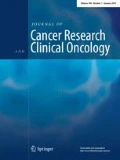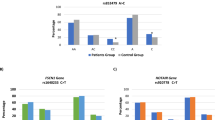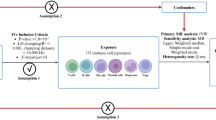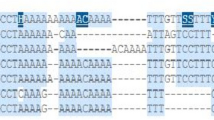Abstract
Purpose
Functional DNA polymorphisms affecting gene expression and serum or saliva levels of interleukins IL-1β,-4,-6,-8,-10 and tumor necrosis factors TNF-α,-β have been associated with increased risk for the development of oral squamous cell carcinoma (OSCC). The present retrospective case–control study examines possible interactions between seven cytokine genotype polymorphisms and their combinatory effect in predicting the occurrence of OSCC in Caucasians.
Methods
Three hundred and thirty Greeks and Germans were studied, consisting of 162 OSCC cases and 168 healthy controls of comparable age, gender, and ethnicity. A series of multivariate logistic regression models, adjusted for age and gender, was constructed in order to assess the contribution of homozygous or heterozygous variant genotypes of polymorphisms IL-1β (+3953C/T), IL-4 (-590C/T), IL-6 (-174G/C), IL-8 (-251A/T), IL-10 (-1082A/G), TNF-α (-308G/A) and TNF-β (+252G/A) upon overall, early and advanced stages of OSCC development.
Results
The contribution of TNF-α and IL-6 was consistent and robust in almost all models constructed. Furthermore, when the mode of inheritance of each variant allele was taken into account in a “biological” multivariate logistic regression model, four polymorphisms emerged as primary predictors for overall stages of OSCC: TNF-α (OR = 15.27; 95% CI = 7.30–31.96), IL-6 (OR = 8.33; 95% CI = 3.95–17.58), IL-8 (OR = 3.54; 95% CI = 1.69–7.43) and IL-10 (OR = 2.65; 95% CI = 1.28–5.46). Finally, IL-1β, IL-4 and TNF-β polymorphisms were not primary predictors of OSCC development in all constructed models.
Conclusions
This study revealed the highly significant contributions of two out of seven studied cytokines (IL-6 and TNF-α) in the occurrence of OSCC. Based on these findings and previous reports, possible stoichiometrical interactions of cytokines leading to OSCC development are discussed.

Similar content being viewed by others
References
Berghella AM, Contasta I, Pellegrini P, Del Beato T, Adorno D (2002) Peripheral blood immunological parameters for use as markers of pre-invasive to invasive colorectal cancer. Cancer Biother Radiopharm 17:43–50
Bergman M, Ahnstrom M, Palmeback Wegman P, Wingren S (2005) Polymorphism in the manganese superoxide dismutase (MnSOD) gene and risk of breast cancer in young women. J Cancer Res Clin Oncol 131:439–444
Boccia S, Cadoni G, La Torre G, Arzani D, Volante M, Cattel C, Gianfagna F, Paludetti G, Almadori G, Ricciardi G (2006) A case–control study investigating the role of sulfotransferase 1A1 polymorphism in head and neck cancer. J Cancer Res Clin Oncol 132:466–472
Cozar JM, Romero JM, Aptsiauri N, Vazquez F, Vilchez JR, Tallada M, Garrido F, Ruiz-Cabello F (2007) High incidence of CTLA-4 AA (CT60) polymorphism in renal cell cancer. Hum Immunol 68(8):698–704
Jablonska E, Piotrowski L, Grabowska Z (1997) Serum Levels of IL-1b, IL-6, TNF-a, sTNF-RI and CRP in patients with oral cavity cancer. Pathol Oncol Res 3:126–129
Jia C, Liu T, Liu Z, Li M, Hu M (2007) Joint effects of eNOS gene T-786C and ADH2 Arg47His polymorphisms on the risk of premature coronary artery disease. Thromb Res 120:679–684
Jin Q, Hemminki K, Enquist K, Lenner P, Grzybowska E, Klaes R, Henriksson R, Chen B, Pamula J, Pekala W, Zientek H, Rogozinska-Szczepka J, Utracka-Hutka B, Hallmans G, Forsti A (2005) Vascular endothelial growth factor polymorphisms in relation to breast cancer development and prognosis. Clin Cancer Res 11:3647–3653
Fishman D, Faulds G, Jeffery R, Mohamed-Ali V, Yudkin JS, Humphries S, Woo P (1998) The effect of novel polymorphisms in the interleukin-6 (IL-6) gene on IL-6 transcription and plasma IL-6 levels, and an association with systemic-onset juvenile chronic arthritis. J Clin Invest 102:1369–1376
Fujieda S, Sunaga H, Tsuzuki H, Fan GK, Saito H (1999) IL-10 expression is associated with the expression of platelet-derived endothelial cell growth factor and prognosis in oral and oropharyngeal carcinoma. Cancer Lett 136:1–9
Kleinrath T, Gassner C, Lackner P, Thurnher M, Ramoner R (2007) Interleukin-4 promoter polymorphisms: a genetic prognostic factor for survival in metastatic renal cell carcinoma. J Clin Oncol 25(7):845–851
Ku KT, Wan L, Peng HC, Tsai MH, Tsai CH, Tsai FJ (2005) Vascular endothelial growth factor gene-460 C/T polymorphism is a biomarker for oral cancer. Oral Oncol 41:497–502
Lejeune FJ (2002) Clinical use of TNF revisited: improving penetration of anti-cancer agents by increasing vascular permeability. J Clin Invest 110:433–435
Lindpaintner K, Pfeffer MA, Kreutz R, Stampfer MJ, Grodstein F, LaMotte F, Buring J, Hennekens CH (1995) A prospective evaluation of an angiotensin-converting-enzyme gene polymorphism and the risk of ischemic heart disease. N Engl J Med 332:706–711
Loktionov A, Watson MA, Stebbings WS, Speakman CT, Bingham SA (2003) Plasminogen activator inhibitor-1 gene polymorphism and colorectal cancer risk and prognosis. Cancer Lett 189:189–196
Massano J, Regateiro FS, Januario G, Ferreira A (2006) Oral squamous cell carcinoma: review of prognostic and predictive factors. Oral Surg Oral Med Oral Pathol Oral Radiol Endod 102:67–76
Matsumura S, Oue N, Nakayama H, Kitadai Y, Yoshida K, Yamaguchi Y, Imai K, Nakachi K, Matsusaki K, Chayama K, Yasui W (2005) A single nucleotide polymorphism in the MMP-9 promoter affects tumor progression and invasive phenotype of gastric cancer. J Cancer Res Clin Oncol 131:19–25
Messer G, Spengler U, Jung MC, Honold G, Blomer K, Pape GR, Riethmuller G, Weiss EH (1991) Polymorphic structure of the tumor necrosis factor (TNF) locus: an NcoI polymorphism in the first intron of the human TNF-beta gene correlates with a variant amino acid in position 26 and a reduced level of TNF-beta production. J Exp Med 173:209–219
Miettinen M, Vuopio-Varkila J, Varkila K (1996) Production of human tumor necrosis factor alpha, interleukin-6, and interleukin-10 is induced by lactic acid bacteria. Infect Immun 64:5403–5405
Myers JN, Yasumura S, Suminami Y, Hirabayashi H, Lin W, Johnson JT, Lotze MT, Whiteside TL (1996) Growth stimulation of human head and neck squamous cell carcinoma cell lines by interleukin 4. Clin Cancer Res 2:127–135
Neville BW, Day TA (2002) Oral cancer and precancerous lesions. CA Cancer J Clin 52:195–215
Rhodus NL, Ho V, Miller CS, Myers S, Ondrey F (2005) NF-kappaB dependent cytokine levels in saliva of patients with oral preneoplastic lesions and oral squamous cell carcinoma. Cancer Detect Prev 29:42–45
Schindler R, Mancilla J, Endres S, Ghorbani R, Clark SC, Dinarello CA (1990) Correlations and interactions in the production of interleukin-6 (IL-6), IL-1, and tumor necrosis factor (TNF) in human blood mononuclear cells: IL-6 suppresses IL-1 and TNF. Blood 75:40–47
Song C, Xing D, Tan W, Wei Q, Lin D (2001) Methylenetetrahydrofolate reductase polymorphisms increase risk of esophageal squamous cell carcinoma in a Chinese population. Cancer Res 61:3272–3275
St John MA, Li Y, Zhou X, Denny P, Ho CM, Montemagno C, Shi W, Qi F, Wu B, Sinha U, Jordan R, Wolinsky L, Park NH, Liu H, Abemayor E, Wong DT (2004) Interleukin 6 and interleukin 8 as potential biomarkers for oral cavity and oropharyngeal squamous cell carcinoma. Arch Otolaryngol Head Neck Surg 130:929–935
The International HapMap Project (2003) Nature 426:789–796
Tsai MH, Chen WC, Tsai CH, Hang LW, Tsai FJ (2005) Interleukin-4 gene, but not the interleukin-1 beta gene polymorphism, is associated with oral cancer. J Clin Lab Anal 19:93–98
Vairaktaris E, Yiannopoulos A, Vylliotis A, Yapijakis C, Derka S, Vassiliou S, Nkenke E, Serefoglou Z, Ragos V, Tsigris C, Vorris E, Critselis E, Avgoustidis D, Neukam FW, Patsouris E (2006) Strong association of interleukin-6 -174 G > C promoter polymorphism with increased risk of oral cancer. Int J Biol Markers 21:246–250
Vairaktaris E, Yapijakis C, Serefoglou Z, Derka S, Vassiliou S, Nkenke E, Vylliotis A, Wiltfang J, Avgoustidis D, Critselis E, Neukam FW, Patsouris E (2007a) The interleukin-8 (-251A/T) polymorphism is associated with increased risk for oral squamous cell carcinoma. Eur J Surg Oncol 33:504–507
Vairaktaris E, Yannopoulos A, Vassiliou S, Serefoglou Z, Vylliotis A, Nkenke E, Critselis E, Avgoustidis D, Yapijakis C, Neukam FW, Patsouris E (2007b) Strong association of interleukin-4 (-590 C/T) polymorphism with increased risk for oral squamous cell carcinoma in Europeans. Oral Surg Oral Med Oral Pathol Oral Radiol Endod 104(6):796–802
Vairaktaris E, Serefoglou Z, Yapijakis C, Vasiliou S, Derka S, Nkenke E, Vylliotis A, Ragos V, Neukam FW, Patsouris E (2007c) The interleukin-1 beta gene polymorphism +3953 C/T is not associated with risk for oral cancer. Anticancer Res 27(6):3979–3984
Vairaktaris E, Yapijakis C, Serefoglou Z, Derka S, Vasiliou S, Nkenke E, Vylliotis A, Spyridonidou S, Neukam FW, Patsouris E (2008) Gene expression polymorphism of interleukin-10 is associated with risk for oral cancer. Anticancer Res 28(1A):309–314
Voorzanger N, Touitou R, Garcia E, Delecluse HJ, Rousset F, Joab I, Favrot MC, Blay JY (1996) Interleukin (IL)-10 and IL-6 are produced in vivo by non-Hodgkin’s lymphoma cells and act as cooperative growth factors. Cancer Res 56:5499–5505
Watanabe H, Iwase M, Ohashi M, Nagumo M (2002) Role of interleukin-8 secreted from human oral squamous cell carcinoma cell lines. Oral Oncol 38:670–679
Williams HK (2000) Molecular pathogenesis of oral squamous carcinoma. Mol Pathol 53:165–172
Wong YK, Chang KW, Cheng CY, Liu CJ (2006) Association of CTLA-4 gene polymorphism with oral squamous cell carcinoma. J Oral Pathol Med 35:51–54
Xu J, Lowey J, Wiklund F, Sun J, Lindmark F, Hsu FC, Dimitrov L, Chang B, Turner AR, Liu W, Adami HO, Suh E, Moore JH, Zheng SL, Isaacs WB, Trent JM, Gronberg H (2005) The interaction of four genes in the inflammation pathway significantly predicts prostate cancer risk. Cancer Epidemiol Biomarkers Prev 14:2563–2568
Yapijakis C, Vairaktaris E, Vassiliou S, Vylliotis A, Nkenke E, Nixon AM, Derka S, Spyridonidou S, Vorris E, Neukam FW, Patsouris E (2007) The low VEGF production allele of the +936C/T polymorphism is strongly associated with increased risk for oral cancer. J Cancer Res Clin Oncol 133:787–791
Yapijakis C, Vairaktaris E, Serefoglou Z, Vylliotis A, Nkenke E, Derka S, Vassiliou S, Avgoustidis D, Neukam F, Patsouris E (2008) Association of polymorphisms affecting gene expression of tumor necrosis factor alpha and beta with increased risk for oral cancer. Int J Biol Markers (in press)
Yoshida S, Ono M, Shono T, Izumi H, Ishibashi T, Suzuki H, Kuwano M (1997) Involvement of interleukin-8, vascular endothelial growth factor, and basic fibroblast growth factor in tumor necrosis factor alpha-dependent angiogenesis. Mol Cell Biol 17:4015–4023
Acknowledgments
This work was supported in part by EPEAEK “Pythagoras” grant 70/3/7391 of the Greek Secretariat of Research and Technology to E.V.
Author information
Authors and Affiliations
Corresponding author
Additional information
Eleftherios Vairaktaris and Christos Yapijakis have contributed equally in this work.
Rights and permissions
About this article
Cite this article
Vairaktaris, E., Yapijakis, C., Serefoglou, Z. et al. Gene expression polymorphisms of interleukins-1β, -4, -6, -8, -10, and tumor necrosis factors-α, -β: regression analysis of their effect upon oral squamous cell carcinoma. J Cancer Res Clin Oncol 134, 821–832 (2008). https://doi.org/10.1007/s00432-008-0360-z
Received:
Accepted:
Published:
Issue Date:
DOI: https://doi.org/10.1007/s00432-008-0360-z




